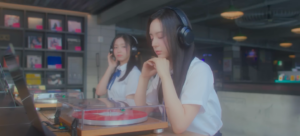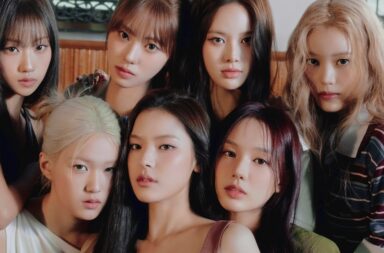
It feels slightly incorrect to describe Madein as a new group debuting this week with their first mini album, Rise. Their group name is apparently short for ‘We Madein U’, a reference to how the group was formed by fan support, as the members have all competed in various audition and survival shows previously. Mashiro and Yeseo are former members of Kep1er, the girl group formed from the show Girls Planet 999, of which MiU is also a former competitor. MiU is also a former member of the group Limelight, along with Gaeun and Suhye, the latter of which was also a contestant on My Teenage Girl. Finally, Serina and Nagomi were also contestants on Produce 101 Japan The Girls. Got all that?
Whilst idols being members of multiple groups is nothing new, especially after participating in audition shows, it feels novel to have the group acknowledge this so openly in their branding. With Kep1er and Limelight as respective starting points, it would seem like Madein is well-placed to enter the scene with a sense of expertise. This does come through in their debut single “Uno”, though the other tracks in their first mini album, whilst similarly well done, sometimes suffer from an over-reliance on one style and formula.

As the leading single, “Uno” is a light, ethereal piece of gauzy pop. It shares a lot of DNA with the lead singles of former group Limelight, whose songs like “Eye to Eye” share a similar calm mid-tempo and breezy backdrop. Whilst Madein is seemingly a new group formed using Limelight members, rather than a straightforward rebrand, the musical stylings remain almost the same. The driving baseline of “Eye to Eye” is not here in “Uno”, but a similarly exciting stuttering chorus beat takes its place. The soundscape is just as light, with echoes and trickling synths swimming under a rhythm that remains light throughout the song. It seems odd for this new group to have stayed so close to the music of one of their former iterations, but maybe it’s because of how effective it is in execution that they kept it around.
“Uno” does have some unique points, namely the stammering of the lyrics to match the skittering beat. For example, the line “Hold onto my hands, and behind the clouds” then stretches out the word “behind” (in Korean, as “dwi-eh”) to repeat over the song’s beat. It’s a simple touch, but it adds to the song’s trippy, late-90s club sound, and is a whimsical little touch in a song that feels evocative of clouds, skies and stars.
This atmosphere comes through in the title track’s lyrics too, with multiple references to the beauty of the natural world.
Lookin’ like flowers to me yeah,
Your eyes illuminate the sea,
How many legs you got wait, time time time.
On closer look you got wings, flutter
Fly, fly, fly
The repetition in the lyrics matches the vocal and instrumental echoes throughout the song, while the flowers, sea, and wings keep us in a solidly pretty version of nature. The questioning about how many legs “you” have before they turn into wings is a wonderfully surreal touch that doesn’t really appear again in the album, which is a shame, as it’s an unusual angle to approach what seems to be the metamorphosis of a butterfly.

The flashes of creativity from this lyric, and the composition of the music of “Uno”, unfortunately, don’t do more than flash in the other three tracks of the album. The second song on the album, “Dadarida”, is undeniably catchy, moving slightly away from a trippy ethereal vibe to a samba-esque use of rhythmic, powerful drums in the song’s opening and chorus.
The following track, “Dopamine”, turns its heel and goes straight back to the sonic style of “Uno”, sounding at times like Loona, or early GFriend or Oh My Girl in its musical lightness. There is nothing to dislike about these musical choices at all—if anything, it’s refreshing to hear music that leans away from the stompier, darker, and noisier sounds that are never too far away on the K-pop horizon.
The problem is that, unfortunately, neither “Dopamine” nor “Dadarida” want to move away from the formula set out in “Uno”. The light, trippy sound is great, and “Dadarida” is a little more playful with its differing rhythms. It even injects a little surrealism in its lyrics: the line “demons are always sweet to have” is a twist on the natural beauty in “Uno”.

However, the charming repetitions of “Uno” become a bit of a crutch in “Dadarida”, with its repeated nonsense chorus feeling very like what we’ve heard before. It also descends, for a moment, into a clunky little speech-singing breakdown, where the lyrics feel like a kind of out-of-place word smashing of popular social media phrases.
Zero, zero, zero, zero, zero to the Hunnid,
We can drive it like crazy, Crazy
It isn’t necessary, adds nothing to an otherwise fun song, and also fails to build on what came before it. “Dopamine” doesn’t even have any of the musical differences to “Uno” that “Dadarida” does. The soundscape is the same, the vocals are floaty and airy, but there is absolutely nothing about this song that goes in any new direction for the album.
The biggest difference in sound comes in the album’s final track, the near-obligatory ballad “Timeline”. This song is significantly performed by Mashiro and Yeseo, the two former Kep1er members. This choice automatically creates a greater sense of intimacy, and could certainly open up interpretations of the song referencing these members’ time in their former group. There is certainly a lot within the lyrics to support this reading of the song.
Our time is always connected,
My other half is for you,
I’ll always leave that spot empty

This sense of wistful nostalgia, tinged with sadness, could well be read as a nod to the significance of their former group, former members and former fans. It is accompanied by an uninventive melody, though there are moments that allow both members to reach some wonderfully tender high notes. As much as the song is not particularly creative in construction (it’s a slow rhythm, with an acoustic guitar backing), it is nice to end the album with something that varies from its main formula. Perhaps, given the disparate origins of the members from various groups and programs, some more sub-unit songs could have added a nice touch, especially given the “made by you” branding that the group is leading with.
Rise, though lacking in creativity across tracks, does deliver four solid songs for this group’s birth/rebirth. The formula that they have found in light, almost 2015-era K-pop reminiscent shimmer-pop, works extremely well as a lead single. It’s just a disappointment that there isn’t so much more diversity and play in the other songs. There are glimmers, such as the driving drums of “Dadarida” and the tenderness of “Timeline”. However, in order to really stamp themselves onto the K-pop scene in 2024, Madein could push even further by utilizing the different origin stories of the members, and the potential that these differences could bring to their imagination.
(Lyrics via Chaereve. Images via 143 Entertainment.)


